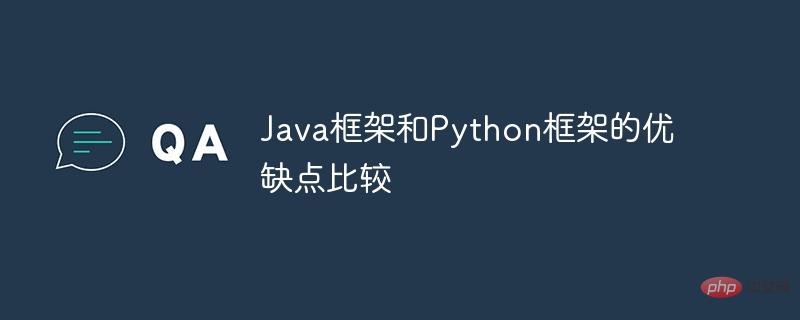
Java frameworks are known for their robustness, performance, and rich ecosystem, but they are complex to learn and deploy. The Python framework is known for its ease of use, flexibility, small size and lightweight, but its performance is low and its stability is insufficient. The specific choice depends on the project requirements. If robustness is required, the Java framework is better; if ease of use is required, the Python framework is more suitable.

Comparison of the advantages and disadvantages of Java framework and Python framework
In software development, choosing the right framework is crucial. Java and Python are two widely used languages that provide rich frameworks to meet different project needs. This article will compare the pros and cons of Java and Python frameworks to help you choose the best one for your project.
Java Framework
Java framework is known for its robustness, performance and reliability. Listed below are some of the advantages of Java frameworks:
However, Java frameworks also have the following disadvantages:
Python Framework
The Python framework is known for its ease of use, flexibility, and being small and lightweight. Listed below are some of the advantages of Python frameworks:
However, the Python framework also has the following shortcomings:
Practical cases
The following are some practical cases of Java and Python frameworks:
Conclusion
Java frameworks and Python frameworks each have their own advantages and disadvantages. Choosing the right framework depends on the specific needs of your project. For applications that require robustness, performance, and reliability, Java frameworks may be a better choice. For applications that require ease of use, flexibility, and small and lightweight size, Python frameworks may be a better choice.
The above is the detailed content of Comparison of the advantages and disadvantages of Java frameworks and Python frameworks. For more information, please follow other related articles on the PHP Chinese website!
 Connected to wifi but unable to access the Internet
Connected to wifi but unable to access the Internet
 Else usage in Python loop structure
Else usage in Python loop structure
 What is the difference between full-width spaces and half-width spaces?
What is the difference between full-width spaces and half-width spaces?
 what does usb interface mean
what does usb interface mean
 How to use imfinfo function
How to use imfinfo function
 How to set up ftp server
How to set up ftp server
 Complement algorithm for negative numbers
Complement algorithm for negative numbers
 How to speed up web pages
How to speed up web pages




